 Petzlover
Petzlover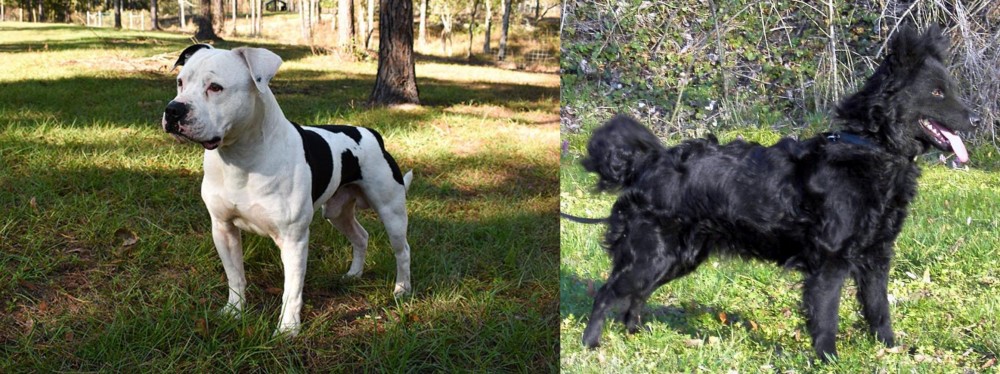 American Bulldog is originated from United States but Mudi is originated from Hungary. American Bulldog may grow 23 cm / 10 inches higher than Mudi. American Bulldog may weigh 40 kg / 89 pounds more than Mudi. Both American Bulldog and Mudi has almost same life span. Both American Bulldog and Mudi has almost same litter size. American Bulldog requires Low Maintenance. But Mudi requires Moderate Maintenance
American Bulldog is originated from United States but Mudi is originated from Hungary. American Bulldog may grow 23 cm / 10 inches higher than Mudi. American Bulldog may weigh 40 kg / 89 pounds more than Mudi. Both American Bulldog and Mudi has almost same life span. Both American Bulldog and Mudi has almost same litter size. American Bulldog requires Low Maintenance. But Mudi requires Moderate Maintenance
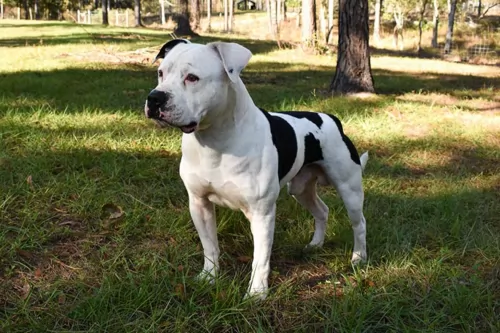 Following World War II, the American Bulldog was almost extinct.
Following World War II, the American Bulldog was almost extinct.
Thanks to John D. Johnson from Summerville, Georgia the breed is still with us today. He gathered the best dogs he could find throughout the rural South and bred them back into popularity among his family and other rural families. His father bred the American Bulldog before John did and they have bred them longer than any other in any part of the world. His dogs were regularly used for tracking, hunting, guarding, watchdog and weight pulling. At some point Alan Scott joined Johnson breeding other bulldogs to Johnson's and forming the Standard American Bulldog.
The American Bulldog/ is popular today as a family pet and companion as well as a working dog.
 Sometime between the 4th and 6th centuries, the Great Migration – a variety of dogs came to live in the Carpathian Mountains on the Great Hungarian Plain. This migration period brought sheepdogs and herders brought by shepherds. These dogs were of two sizes both small and large. The smaller ones were bred together – Pumi, Puli, and Mudi. Because of this, these breeds share the same history, with the Mundi being the oldest of them all.
Sometime between the 4th and 6th centuries, the Great Migration – a variety of dogs came to live in the Carpathian Mountains on the Great Hungarian Plain. This migration period brought sheepdogs and herders brought by shepherds. These dogs were of two sizes both small and large. The smaller ones were bred together – Pumi, Puli, and Mudi. Because of this, these breeds share the same history, with the Mundi being the oldest of them all.
The Mundi was finally separated from the other breeds about 1930 when Dr. Deszo Fenyesi began to breed them. It was in 1966 when the F.C.I. finally approved the standard for the breed. Still then as today, there were not many breeders developing the Mudi. They are working dogs – farm dogs – herders, guard dogs and ratters. He is also known as a tracker, with the majority of the breed living in Hungary.
As the Mudi was bred separately from the Pumi and the Puli, differences between the breeds became clear. Many Mudi are born with a stump or no tail at all. The Mudi is not a great dog for the first timer. He is stubborn, assertive and needs a lot of socialization and exercise. In 2004 breeders in the United States created the Mudi Club of America to preserve the breed and foster responsible ownership. This is a clever, active and keen breed, very loyal to his family but wary of strangers. The United Kennel Club recognized the breed in 2006.
In Hungary, these are still a breed of herding dogs capable of running 500 sheep at a time. They are versatile, courageous, intelligent and agile. They are great in obedience trials, agility, and flyball. In Finland and the United States, they also work as search and rescue dogs.
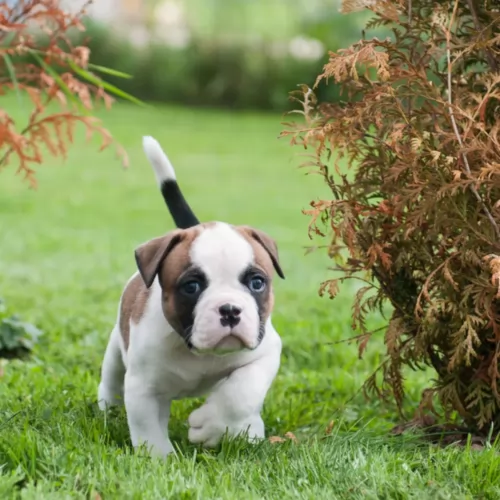 The American Bulldog is a powerful and muscular dog in a sturdy and compact frame. The female is more refined than the heavy boned and stocky male, but both genders are athletic, agile and quick. The have large heads, strong jaws, a muscular neck and with a moderately deep and wide chest.
The American Bulldog is a powerful and muscular dog in a sturdy and compact frame. The female is more refined than the heavy boned and stocky male, but both genders are athletic, agile and quick. The have large heads, strong jaws, a muscular neck and with a moderately deep and wide chest.
They have a square head, with muscular cheeks and a clearly defined furrow between his eyes. With broad, square and strong muzzles, they have a reverse scissors, scissors, moderate underbite and an even bite. Ears come in a variety of shapes and sizes and eyes can be any color as well. The nose however should be black and lips black as well. Their legs are strong, heavy boned and straight with well-defined muscles in the hindquarters. Finally ,they have a thick, low set tail that comes to a point at the end.
 This is a medium size dog with an almost square profile. They have erect ears on wedge-shaped heads. He is not a strong boned but medium boned. That square profile is based in large part on their very square stance. Their muzzle is about half the length of their head and they have what is considered a “dare devil” expression in their dark, almond-shaped eyes. The color of the eyes is important and must match with the color of the dog or the standard is not met.
This is a medium size dog with an almost square profile. They have erect ears on wedge-shaped heads. He is not a strong boned but medium boned. That square profile is based in large part on their very square stance. Their muzzle is about half the length of their head and they have what is considered a “dare devil” expression in their dark, almond-shaped eyes. The color of the eyes is important and must match with the color of the dog or the standard is not met.
Merle fur – brown, brown speckled, blue eyes.
Brown or gray-brown fur – Brown eyes
Gray fur – gray eyes
What is not acceptable is having yellow eyes and black fur; pink eyes and white fur. The lips, eye rims, and nose must all have the same pigmentation. This should be black in all but the brown and brown-grey dogs. These dogs have brown noses, eye rims, and lips. The tail can be almost anything from full to bob. All are considered to be natural lengths for a Mudi.
Their coat is self-cleaning and won’t mat. It is on the long side. In fact, a short, flat, smooth coat is a disqualification from the standard. The color of the coat ranges from white to brown to gray, gray-brown, merle, golden, cream and white. Very little markings of any kind are usual.
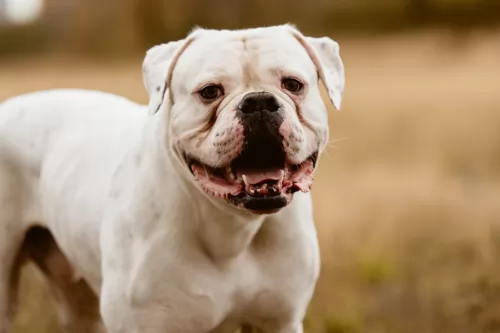 The American Bulldog is characteristically loyal, brave and reliable. It is a friendly, gentle dog that truly loves children. There is not a hostile bone in his body despite his history and reputation for bull baiting. Though he is protective of its family and affectionate with most, he still needs a human companion who is strong willed and a genuine pack leader. Without this he might become aggressive around other dogs and pets. They are immensely self-confident and they do slobber and drool and will become excited and hard to handle without daily exercise of both their body and their minds.
The American Bulldog is characteristically loyal, brave and reliable. It is a friendly, gentle dog that truly loves children. There is not a hostile bone in his body despite his history and reputation for bull baiting. Though he is protective of its family and affectionate with most, he still needs a human companion who is strong willed and a genuine pack leader. Without this he might become aggressive around other dogs and pets. They are immensely self-confident and they do slobber and drool and will become excited and hard to handle without daily exercise of both their body and their minds.
 Yes, they are great with children and love being a part of a large family or “pack”.
Yes, they are great with children and love being a part of a large family or “pack”.
They are extremely versatile and great at herding and guarding.
They are adaptable if you are. They don’t need to live in the country, but they need space to run and play.
They are highly intelligent but a little stubborn. Their ability to learn is high but you have to be the boss.
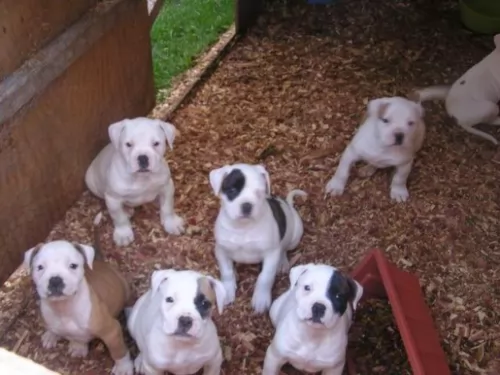 Though generally healthy, the American Bulldog is prone to a few problems.
Though generally healthy, the American Bulldog is prone to a few problems.
This is a serious issue in many breeds of dogs and is especially prevalent with the American Bull Dog. This may seem ironic in such a short legged dog but it is unfortunately very common. It is a genetic disorder that causes the bones in the joint to separate and causes the dog much pain and lameness.
Due to skin folds you need to be care and watch for irritation and infection in the folds. They are also prone to ear infections.
The American Bulldog is prone to overeating and all the health issues that presents. With short legs and a genetic predisposition to arthritis and hip dysplasia, obesity is a real health risk for your bulldog.
 The Mudi does face several of the problems that medium to large dogs often face and some eye issues as well.
The Mudi does face several of the problems that medium to large dogs often face and some eye issues as well.
 The Mudi needs a high quality, medium breed puppy dry food and should be fed 3 or 4 times a day for a total of 1 and ½ to 2 cups.
The Mudi needs a high quality, medium breed puppy dry food and should be fed 3 or 4 times a day for a total of 1 and ½ to 2 cups.
The adult should be fed at least twice a day with an adult medium breed high-quality dry dog food. Don’t overfeed as the breed can have a tendency toward obesity.
They have great stamina and agility.
This is a working dog and like most herding dogs, they need a job and a lot of activity. Long walks every day and either a large yard or visits to a dog park. Involve them in herding activities or Barn Hunt if you can. Playing is their way of working when they are not herding real animals. So, if you want this breed, be sure you have time for playing with them. They are great at agility, flyball, obedience, frisbee trials, tracking and of course herding